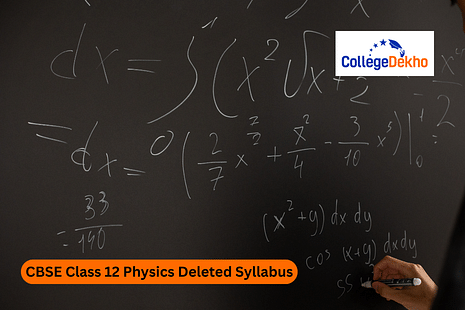

Never Miss an Exam Update
CBSE Class 12 Physics Deleted Syllabus 2025-26 must be checked in detail before appearing for the board exams. There was no reduction made by the Central Board of Secondary Education after the 2020-21 session. The Board is continuing with the same syllabus this year as well. The Board also refuted rumors about changes to its examination system. The board firmly stated that it has not reduced any syllabus for Class 12 by 15%. Some topics are deleted from the syllabus by the board. The change has been introduced to provide a better understanding of the Physics syllabus to students. The students preparing the CBSE Class 12 Physics Syllabus 2025-26 should check the latest syllabus and prepare a study schedule accordingly.
The subject is divided into theory and practical exams. The theory exam will be of 70 marks, and the practical will be conducted for 30 marks. In this article, we have mentioned the names of topics from each chapter that have been deleted from the CBSE Class 12 Physics syllabus. Go through the article in detail to know which topics have to be avoided.
Latest Update:
- Dec 18, 2025: The Central Board of Secondary Education (CBSE) will conduct the CBSE Class 12 exams 2026 between February 17 and April 9, 2026, in pen and paper format. The Board released the Final CBSE 12th date sheet 2026 on October 30, 2025, on the official website- cbse.nic.in.
Also Read - CBSE Class 12 Physics Previous Year Question Papers
CBSE Class 12 Physics Deleted Syllabus
Students can check the physics deleted syllabus class 12 cbse 2025-26 here:
Chapter | Page No. | Dropped Topics and Chapters |
|---|---|---|
Chapter 1: Electric Charges and Fields | 2–7 47–50 | 1.2 Electric Charge (delete only activity with paper strips and making electroscope) 1.3 Conductors and Insulators (delete only the concept of earthing) 1.4 Charging by Induction Exercises 1.13, 1.25–1.34 |
Chapter 2: Electrostatic Potential and Capacitance | 81 87–92 | 2.15 Energy Stored in a Capacitor (delete only derivation) Exercises 2.12 to 2.36 |
Chapter 3: Current Electricity | 102–103 107–109 112–113 120–124 127–131 | 3.7 Resistivity of Various Materials (delete Tables 3.1 and 3.2 and Carbon resistors, Colour code for carbon resistor) 3.10 Combinations of Resistors – Series and Parallel Example 3.5 3.15 Meter Bridge 3.16 Potentiometer Exercises 3.3, 3.4, 3.10, 3.12, 3.14–3.23 |
Chapter 4: Moving Charges and Magnetism | 135 140–142 152–153 162–163 170–172 | Table 4.1 4.4.1 Velocity Selector 4.4.2 Cyclotron 4.8.2 The Toroid 4.10.3 The Magnetic Dipole Moment of a Revolving Electron Exercises 4.14–4.28 |
Chapter 5: Magnetism and Matter | 176–179 180 185–189 191 194–196 200–203 | 5.2.2 Bar Magnet as an Equivalent Solenoid (delete only mathematical treatment) 5.2.3 The Dipole in a Uniform Magnetic Field (delete only mathematical treatment) Example 5.4 185–189 191 194–196 200–203 5.4 Earth’s Magnetism 5.41. Magnetic Declination and Dip Table 5.2 5.6.2 Paramagnetism (delete only Curie’s Law) 5.6.3 Ferromagnetism (delete only Curie’s temperature; and Hysteresis) 5.7 Permanent Magnets and Electromagnets Exercises 5.1, 5.2, 5.9–5.11, 5.13–5.25 |
Chapter 6: Electromagnetic Induction | 215–219 230–232 | 6.7 Energy Consideration: A Quantitative Study 6.8 Eddy Currents Exercises 6.6, 6.10–6.17 |
Chapter 7: Alternating Current | 240 243 246–247 249–251 255–259 266–268 | Figure 7.7 Magnetisation and Demagnetisation of an Inductor Figure 7.10 Charging and Discharging of a Capacitor 7.6.2 Analytical Solution (of series LCR circuit) 7.6.3 Resonance (delete only Sharpness of Resonance) 7.8 LC Oscillations Exercises 7.6, 7.8, 7.10, 7.12–7.26 |
Chapter 8: Electromagnetic Waves | 273–274 276–278 279–280 287 | Example 8.1 8.3.2 Nature of Electromagnetic Waves (delete only about ether and page 277) Example 8.4 and 8.5 Exercises 8.11–8.15 |
Chapter 9: Ray Optics and Optical Instruments | 318 321–322 332–335 346 | 9.3 Refraction (delete only advanced sunrise and delayed sunset) 9.4.1(i) Mirage 9.4.1(ii) Diamond 9.7 Some Natural Phenomena Due to Sunlight 9.7.1 The Rainbow 9.7.2 Scattering of Light Exercise 9.18 |
Chapter 10: Wave Optics | 358–359 359 363–367 368–371 372–376 379–381 383–385 | 10.3.4 Doppler Effect Example 10.1 10.5 Interference of Light Waves and Young’s Experiment (retain the final expressions for dark and bright fringes but delete the derivation; delete expression for fringe width) 10.6 Diffraction (retain only qualitative treatment) 10.6.3 Resolving Power of Optical Instruments 10.6.4 Validity of Ray Optics 10.7.1 Polarisation by Scattering 10.7.2 Polarisation by Reflection Exercises 10.7–10.21 |
Chapter 11: Dual Nature of Radiation and Matter | 388 397 400–404 407–413 | Table 11.1 Example 11.3 11.8 Wave Nature of Matter (delete only derivation for de Broglie wavelength of accelerated electron; and Heisenberg’s uncertainty principle) 11.9 Davisson and Germer Experiment Appendix 11.1 The History of Wave-Particle Flip-Flop Exercises 11.5, 11.7, 11.12 to 11.14, 11.16, 11.17, 11.19–11.37 |
Chapter 12: Atoms | 21–422 424–426 429 430 436–437 | 12.3.1 Spectral Series 12.4 Bohr Model of the Hydrogen Atom (retain only the expression for the radius of the nth possible orbit but delete its derivation) 12.5 The Line Spectra of the Hydrogen Atom (retain only qualitative treatment) Example 12.6 Exercises 12.3, 12.11–12.17 |
Chapter 13: Nuclei | 446–451 452–455 462–466 | 13.6.1 Law of Radioactive Decay 13.6.2 Alpha Decay 13.6.3 Beta Decay 13.6.4 Gamma Decay 13.7.2 Nuclear Reactor Exercises 13.1, 13.2, 13.6–13.10, 13.12–13.14, 13.18, 13.22 13.31 |
Chapter 14: Semiconductor Electronics: Material Devices and Simple Circuits | 485–495 497–499 | 14.8 Special Purpose p-n junction Diodes 14.9 Digital Electronics and Logic Gates Exercises 14.7–14.15 |
List of Deleted Experiments- Section A
- To compare the EMF of two given primary cells using a potentiometer.
- To determine the internal resistance of a given primary cell using a potentiometer.
List of Deleted Experiments- Section B
- To draw the characteristic curve of a Zener diode and to determine its reverse breakdown voltage.
- To determine the wavelength of a laser beam by diffraction.
CBSE Class 12 Physics Syllabus PDF
The PDF of the physics class 12 deleted syllabus 2025-26 is now listed on the official website to be downloaded by the students. You can check the direct PDF of the syllabus from the table given below:
Why Check CBSE Class 12 Physics Deleted Syllabus 2025-26?
Checking the portion that is deleted from the syllabus is a very crucial step for students. Check the benefits of the physics class 12 deleted syllabus 2025-26 here:
- The difficulty level of the CBSE class 12 Physics exam has been reassessed, which is why some topics have been excluded from the board exams. Students must now refer to the updated syllabus to prepare for the board exams.
- The updated CBSE Class 12 Syllabus 2025-26 is easier than the previous syllabus. Students will have a high chance of getting good marks in the board exams due to the lower syllabus.
- You can download the PDF of the deleted syllabus and compare it to the existing syllabus to know more about the topic that you don't need to study.
- The recent syllabus will focus on present-day scenarios. Some topics that are excluded from the board exam may be outdated.
- The topics included in the CBSE Class 12 Physics Deleted Syllabus 2025-26 might be rigorous. Now, the updated CBSE Class 12 Exam Pattern 2025-26 i s broader and focuses more on application-based learning.
Class 12th physics deleted syllabus 2025-26 provides information about the topics deleted from the syllabus. Check the major information about the exercises and the chapters excluded from the board exam, and prepare for the board exams accordingly.
FAQs
Students can easily understand the CBSE Class 12 Physics Syllabus 2026 if they try to study every day. The difficulty level of the syllabus and the paper depends upon the preparation level of the students. If you prepare with a well-structured study schedule then you will be able to pass the board exams without any problem.
CBSE Class 12 Physics Syllabus 2026 is deleted to help students focus more on compact and application learning. The new syllabus will reduce the burden on the students and will help them to understand the concepts more thoroughly rather than mugging up the content of the syllabus.
The experiments excluded from the CBSE Class 12 Physics Syllabus 2026 are 1- Comparing the EMF of two given primary cells using the Potentiometer Determining the internal resistance of a given primary cell using the potentiometer and 2- Drawing the characteristic curve of a Zener diode and determining its reverse breaks down voltage Determining the wavelength of a laser beam by diffraction.
CBSE Class 12 Physics Deleted Syllabus 2025-26 for practicals is Understanding the principle of (1) a NOT gate, (2) an OR gate, and (3) an AND gate to make their equivalent circuits using a bell and cells/battery and keys/switches.
CBSE Class 12 Physics Deleted Syllabus 2025-26 includes topics from Electric Charges and Fields, Electrostatic Potential and Capacitance, Current Electricity, Moving Charges and Magnetism, Magnetism and Matter, Electromagnetic Induction, Alternating Current, Electromagnetic Waves, Ray Optics and Optical Instruments, Wave Optics, Dual Nature of Radiation and Matter, Atoms, Nuclei, and Semiconductor Electronics.
























